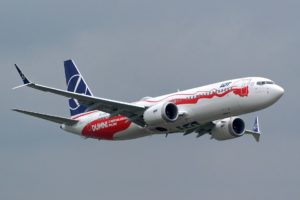
In October 2018, a Boeing 737 MAX plane, Lion Air Flight 610, crashed in Indonesia, killing all 189 passengers and crew. According to the SEC’s Sept. 22 order, Boeing issued a press release, edited and approved by former CEO Dennis Muilenburg, that “highlighted certain aspects of the [Indonesian government’s] preliminary accident report while downplaying others and also offered the public its ‘assurance’ that the 737 MAX is ‘as safe as any airplane that has ever flown the skies.’”
This was false, as Boeing at that point already determined that its flight control function, called the Maneuvering Characteristics Augmentation System (MCAS), “posed an ongoing safety issue that required remediation,” the SEC order stated. “Indeed, Boeing had already begun work on a redesign of the MCAS software to address the safety issue. However, the press release made no mention of the MCAS safety issue or planned software redesign.”
In March 2019, a second 737 MAX, Ethiopian Airlines Flight 302, also crashed, killing all 157 passengers and crew. The U.S. Federal Aviation Administration and other regulators around the world consequently grounded the entire 737 MAX fleet “due to ongoing safety concerns.” The grounding of these planes lasted roughly 20 months.
Once again, Boeing and Muilenburg, while aware of information calling into question certain aspects of the certification process relating to MCAS, told analysts and reporters in April 2019 that “there was no surprise or gap . . . that somehow slipped through [the] certification process” for the 737 MAX and that Boeing had “gone back and confirmed again . . . that we followed exactly the steps in our design and certification processes that consistently produce safe airplanes,” the SEC order stated.
Selective Disclosures
Prior to making those public statements, Boeing had, in response to a U.S. Department of Justice subpoena concerning a criminal investigation into the 737 MAX certification process, “uncovered documents that suggested that key facts about MCAS’s operational scope had not been disclosed to the FAA’s Aircraft Evaluation Group,” the FAA group responsible for the review and approval of pilot training requirements and flight manuals for the 737 MAX, according to the SEC order.
“In addition, an internal compliance review had separately identified certain documentation gaps and inconsistencies relating to MCAS and the certification process,” the SEC order stated. “None of those facts were disclosed or otherwise known to the public at that time.”
Consequently, the SEC found that Boeing and Muilenburg negligently violated the anti-fraud provisions of federal securities laws. Boeing and Muilenburg neither admitted nor denied the SEC’s findings.
“In times of crisis and tragedy, it is especially important that public companies and executives provide full, fair, and truthful disclosures to the markets,” SEC Chair Gary Gensler said in a press release. “The Boeing Company and its former CEO, Dennis Muilenburg, failed in this most basic obligation.” ![]()
PHOTO BY CC BY-SA 4.0
Jaclyn Jaeger is a contributing editor at Compliance Chief 360° and a freelance business writer based in Manchester, New Hampshire.

